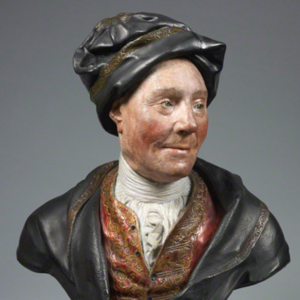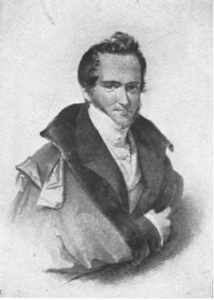The blind lad
(Poet's title: Der blinde Knabe)
Set by Schubert:
D 833
[early 1825]
O sagt, ihr Lieben, mir einmal,
Welch Ding ist’s, Licht genannt?
Was sind des Sehens Freuden all’,
Die niemals ich gekannt?
Die Sonne, die so hell ihr seht,
Mir Armen scheint sie nie;
Ihr sagt, sie auf und nieder geht,
Ich weiß nicht wann, noch wie.
Ich mach’ mir selbst so Tag wie Nacht,
Dieweil ich schlaf’ und spiel’,
Mein inn’res Leben schön mir lacht,
Ich hab’ der Freuden viel.
Zwar kenn’ ich nicht, was euch erfreut,
Doch drückt mich keine Schuld,
D’rum freu’ ich mich in meinem Leid,
Und trag’ es mit Geduld.
Ich bin so glücklich, bin so reich
Mit dem, was Gott mir gab,
Bin wie ein König froh, obgleich
Ein armer blinder Knab’.
Now tell me once and for all, dear friends,
What thing is that which they call light?
What are all those joys of sight
That I have never known?
The sun which you see so bright
It never shines on poor me;
You say it goes up and down,
I do not know when, or how.
I make my own day, similarly night,
While I sleep and play,
My inner life smiles beautifully upon me,
I have many a joy.
Although I do not know what it is that is giving you joy,
I do not feel that there is anything missing,
Therefore I take pleasure in my suffering
And I bear it with patience.
I am so happy, I am so rich,
With what God has given me,
I am as cheerful as a king, despite being
A poor, blind lad.
All translations into English that appear on this website, unless otherwise stated, are by Malcolm Wren. You are free to use them on condition that you acknowledge Malcolm Wren as the translator and schubertsong.uk as the source. Unless otherwise stated, the comments and essays that appear after the texts and translations are by Malcolm Wren and are © Copyright.
☙
Themes and images in this text:
Children and childhood Games and play Joy Light Night and the moon The sun
The Blind Boy
by Colley Cibber
O say! what is that thing call’d light,
Which I must ne’er enjoy?
What are the blessings of the sight?
O tell your poor blind boy!
You talk of wond’rous things you see,
You say the sun shines bright;
I feel him warm, but how can he
Or make it day or night.
My day or night myself I make,
Whene’er I sleep or play;
And could I ever keep awake,
With me ’twere always day.
With heavy sighs I often hear
You mourn my hapless woe;
But sure with patience I can bear
A loss I ne’er can know.
Then let not what I cannot have
My cheer of mind destroy;
Whilst thus I sing, I am a king,
Although a poor blind boy.
This is the sort of text that polarises opinion amongst readers, possibly even within the same reader at one and the same time. It can be seen as a way of entering fully into the inner life of someone we might otherwise never understand or sympathise with, or at might strike us as a hideously insensitive attempt to silence an authentic voice and attribute false sentiments to someone who has been unfairly defined by his disability. The poem (and Schubert’s setting of it) has been known to stimulate tears of compassion and also cringes of embarrassment.
The problem is that this is clearly not a text written by a ‘poor blind boy’. Although there is a long tradition in Western literature of blind writers (from Homer, through Milton and on to Borges and others) speaking powerfully from their experience, what we have here is not on the same level. Colley Cibber (1671 – 1757) was most famous in his own day as a comic actor (specialising in ‘fops’), as a failed tragic actor (he even admitted himself that he was miscast in such roles and once told a fellow actor half way through his performance of Richard III that he wanted to go home), and as a third rate poet who was made Poet Laureate because of his political support of the Whigs:
In merry old England it once was a rule,
The King had his Poet and also his Fool:
But now we’re so frugal, I’d have you to know it,
That Cibber can serve both for Fool and for Poet.
(Alexander Pope, Dunciad 1743)
Such was Cibber’s reputation in early Georgian London that he could hardly have expected many people to read ‘The Blind Boy‘ as a totally sincere or genuinely sympathetic utterance.
Schubert had already set Jakob Nikolaus Craigher de Jachelutta’s German translation of this poem before they met each other in October 1825. On this occasion Craigher de Jachelutta agreed that he would supply Schubert with more English, Spanish, French and Italian texts with German translations following the metre of the original so that the musical setting could be performed in either language. We can only speculate about what attracted the translator to this particular text by Cibber, but it may be connected with Craigher de Jachelutta’s commitment to Roman Catholicism. He probably saw the blind boy’s assertion that he is contented with his lot as a good example for the rest of us when it comes to accepting the will of God. His translation of the final stanza definitely makes the tone of the text more devout than the original (which makes no reference to being happy with ‘what God has given to me’).
Here again, there is a need to be careful about how we approach ‘counting our blessings’. There is surely a difference between a text which is a genuine statement of gratitude for all that life has to offer (with an explanation of how people have come to terms with the challenges that have resulted from their situation) and a text whose purpose is primarily didactic, urging others not to complain about any suffering or injustices they have experienced. One of the reasons why many of us feel uncomfortable with ‘Der blinde Knabe‘ is that it strikes us as being an example of the latter type of text. It seems to be a text addressed TO rather than uttered BY a poor blind lad. It is not just blind people, it is also other poor people and people with other types of disability who are being told that it is their duty to be contented and to be grateful. The implication is that we should all take pleasure in our suffering in the way this lad does.
For the two centuries when Methodism was a dominant influence in the mining and mill towns of northern England, the standard response to the greeting ‘Nah then, ‘ow’s things?’ was always ‘Mustn’t grumble.’ People had been exposed to sermons in which their ministers had discouraged pointless ‘grumbling’ about situations which could not be changed. This did not necessarily mean that they were being urged to accept every major accident or industrial injury as the unchangeable workings of a cruel Providence. Rather, they were usually encouraged to do something positive to ensure that such horrors did not re-occur. The problem was ‘grumbling’, which can be corrosive and spread general negativity. (Not that this lesson was very well learned of course – many of the utterances of ‘Mustn’t grumble’ were clearly ironic!).
And who is it that ‘mustn’t grumble’? If the missing subject is ‘I’, the speaker is trying to cope positively with the situation. ‘I mustn’t grumble’, since it won’t help matters and I need to tell myself to concentrate on the positive. ‘You mustn’t grumble’ is something else entirely. It is an order, an imposition, a rebuke. It is surely this that causes many people to react negatively to ‘The Blind Boy‘. Readers are conscious that poems nearly always have a rhetorical purpose, that they set out to change our perceptions, feelings and attitudes. They hear the voice not of a contented poor blind boy but of a pontificating poet who seems to be telling us all that we mustn’t grumble.
I am happy to accept that I mustn’t and should not grumble, but I very much hope that my personal experience is not interpreted as any sort of preaching to you. Reader, I am in a very small way like that blind boy. My eyesight is fine, but I am lacking another physical sense: I am anosmic (I have no sense of smell). I simply do not know what people are talking about when they refer to odours and stinks. I cannot see the purpose of perfume. I have no need to grumble, since I can use this supposed disability positively. It is a metaphor for all of the other things I am insensitive to, all of the other regions of experience that I know are beyond me yet are significant for others. It reminds me that I do not and cannot know it all. I want to accept my metaphorical blindness. Mustn’t grumble.
☙
Note: Schubert received Craigher’s poem in handwritten form. Craigher did not include it in the printed edition of his poems.
Cibber’s text confirmed with Specimens of the British Poets; with biographical and critical notices, and an essay on English poetry. By Thomas Campbell. In seven volumes. Vol. V. Sewell, 1726, to Carey, 1763. London: John Murray, Albemarle-Street. 1819, page 324; and with A Select Collection of English Songs. In three volumes. Volume the second. London: Printed for J. Johnson in St. Pauls Church-yard. MDCCLXXXIII. [1783], pages 104-105.



